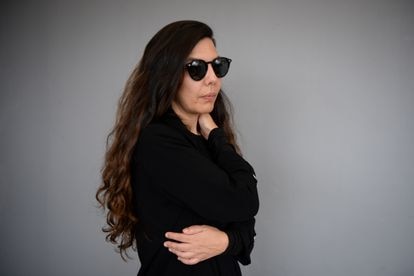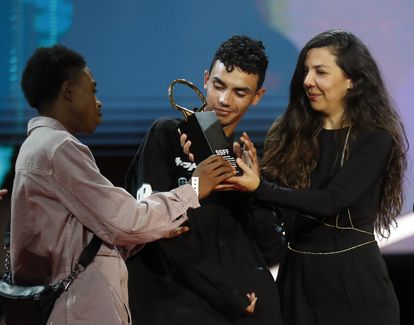Laura Mora (Medellín, 41 years old) is obsessed with justice and defines herself as eternally disobedient. She gets emotional remembering when she and the stars of her most recent film, The Kings of the worlddescended the steps of the Kursaal Auditorium at the San Sebastián Film Festival after the international premiere and were met by hundreds of excited spectators filling the venue with applause.
After a successful tour of festivals in Europe, Mora returned to Colombia to present his second feature film. Less than a month after its launch, the co-production between Mexico, France, Norway and Luxembourg that has been awarded the Golden Shell in San Sebastián, in Spain; The Embrace in Biarritz, in France; and the Golden Eye in Zurich, Switzerland.
Five years after his debut kill jesus, Mora moves away from the autobiographical story. Between delirium and reality, The Kings of the world portrays the complexity of the land conflict in Colombia through the impressive landscapes of Antioquia’s Bajo Cauca, in the Andean region of the country. It is one of the few Colombian road movies; tells the story of the odyssey lived by five young people from the streets of Medellin to find the promised land. Still moved by the reception he received The Kings of the worldMora talks with EL PAÍS about peacebuilding, the future of national cinema and the charm he finds in stories that challenge the system.
Ask: The Kings of the world It was applauded and awarded at several of the most important film festivals in Europe. How do you feel about that reception?
Response: very surprised It has been beautiful. Going to a Class A festival, like San Sebastián, is already a prize. Reaching an official section is very impressive. I did not expect it because the second films are very complex, because everyone is waiting for an extension of the first.
The Kings of the world is very different from kill jesus, takes some risks and I was impressed with the enthusiasm with which it was read. Like that beautiful image in San Sebastián with the boys being applauded. The director of the Festival was waiting for us at the bottom of the stairs, he hugged me and told me: “I haven’t seen the stairs of the venue like this for many years”. Then they return us to the theater because there is a prize. It was too much adrenaline. In Biarritz the reception of the public is impressive, it wins the award for best film and in Zurich it also wins. What more do I ask of life?
newsletter
The analysis of current affairs and the best stories from Colombia, every week in your mailbox
RECEIVE THE
P. In The Kings of the world one of the roots of the conflict in Colombia is addressed: the struggle for land. Is it a pending conversation that we have as a society?
R. Yes. Not enough has been given and people are afraid to give. It was one of the great hopes of the peace process, which is why I strongly supported it. It is the nerve center of our conflict. Just after doing kill jesus, such a personal film, here I was able to talk about how we are all looking for a place to exist freely. In my work there is an obsession with justice. Perhaps because I am the daughter and granddaughter of lawyers and I grew up going to an office where justice was a pillar. Nothing defines us more than the origin; the place where we are born defines us for the rest of our lives. All this has to do with chance and justice.
P. The film was shot in areas that have been and continue to be violent. What were the main challenges of filming there?
I’ve wanted to do something in Bajo Cauca for a long time. When I finish kill jesus I traveled there. Crossing the Alto de Ventanas in Yarumal, just after the fog, I began to have images in my head and began to write in my notebook: boys, boys looking for a place in the world. He put phrases like: some boys doing damage, claiming their own, crossing the landscape. And a piece of news that said: we are the kings of the world.
Filming elsewhere was never an option. There is a magic of shooting in the locations where ideas are born because that feeds the film. Then there is the whole history of violence in the north of Antioquia, which has a history of deeply paramilitary behavior, or Bajo Cauca, absolutely disputed because at every step there is gold and that has been a condemnation. So it became a challenge. Despite the violence, I thought that it could not be that someone prevents us from building beauty, because art is also an aesthetic relationship with the world, aesthetics understood from something very spiritual -my spirituality is in the cinema-. I didn’t want anyone to stop us from doing that and we only found beauty, solidarity and love in those territories.
P. Why did you choose to work with natural actors?
R. Because for me there are truths that are not built, ways of inhabiting the world, of speaking, scars. Casting in Medellin for a scene from kill jesuswe were with several guys who practiced gravity bike, and there I met most of those who star in the film today. I was impressed by their freedom, they were the punkers of the neighborhood without realizing it, the anarchists, and that’s why they weren’t in a combo. They are foolish, free, irrepressible, indomitable spirits. I love disobedience. In them I find my own contradiction: they hate the world but love life. I can relate to many things with them.
P. An important masculine component is identified in his work. As in his short Brotherhood, here the main actors are men. Is it intentional?
R. I am very interested in the world of men, because violence is a very masculine inheritance. In such a violent country, many of the victims, of the dead, have been young and humble men. As a woman, I am very interested in looking at the fragility of men, how they relate to each other in the absence of women. This film allowed me to explore it with five men. Ra, the leader, is justice; Davy is the mystic, so he can be a martyr; Winny, the little one, for me is the revolution; Culebro, which is like the antagonist, was rage; Nano, the Afro boy, for me was dignity. Those things almost form a single character.
P. Most of the women who appear in the film are sex workers and have a relationship with the five men with a motherly tone. Why?
R. In my notes they arrive at a brothel called Una Matria. For me, Colombia is a deeply supportive but very battered woman, who has children in the war and has been somewhat forgotten. They are natural actresses, sex workers from the Guerreras del Centro and Putamente Poderosas groups, older women who have practiced prostitution in Medellín. They are amazing women. During the shoot I told them: imagine that you live alone in this house and don’t need anything, but once a month you open the doors for certain old clients and to collect money. They come back, close it and lock themselves up. This is how we built the idea of this motherland. For me it was the nostalgia of mothers who have lost their children and of children looking for their mother.

P. Although the film is shot through with conflict, it is much less explicit than kill jesus and it has poetic overtones. What is your intention?
R. I am interested in cinema that poses risks to the viewer. For me, talking about such painful issues, about the world that hurts me a lot, is only possible through beauty. For me that beauty is in the margin and there is no possibility of talking about pain without the poetry that implies that a viewer can create their own questions or conclusions about what they are seeing. I want to leave a space for that image to cohabit with me, hopefully through the complexity of a language that is not pointing the finger saying “you have to think or feel this”.
P. You talk about the importance of speaking from the sidelines. Do you think cinema needs peripheral vision?
R. It is urgent that the periphery can speak of the center. I copied this from Lucrecia Martel, who in an interview said ‘a boy from the village is needed to tell Buenos Aires from the center’. I want to see a boy from the commune recounting the privilege of El Poblado de Medellín. In general, I feel that Colombian cinema is eager for cinematographic challenges to the upper classes, in which there has been hidden violence, exclusion and hatred. I have felt the human spirit in its most basic and beautiful form in other places.
P. The pandemic strongly affected the growing film industry in Colombia. How to continue with the momentum that the industry had in recent years?
R. I think it is important to maintain the public policies that have worked. Find how to expand funds. This film would not have been possible in any way if it had not won a call from the Film Development Fund. Since Dog eat dog until The Embrace of the Serpent, they all depend on those funds. Now it is crucial to expand the territories, so that they support regional production. I can’t wait to see a more peripheral cinema, that the periphery tells us and not the other way around.
subscribe here to the EL PAÍS newsletter on Colombia and receive all the informative keys of the country’s current affairs.

